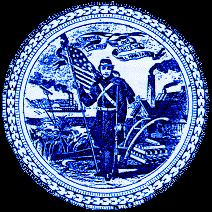Private Myron Billings
Fifth Iowa Volunteer Cavalry


Private Myron Edward Billings had an amazingly diverse military career during the War Between the States. Piecing it completely together will demand more than the limited resources available to the general researcher. It is hoped that some descendant of this distinguished veteran will undertake that project and convey their findings to the Fifth Iowa Cavalry domain so that we can share the information with others.
On February 1, 1864, Billings enlisted as a private in Company L of the Fifth Iowa Cavalry. Two short weeks later he was discharged from the regiment so that he might accept a commission as a second lieutenant in Company A of the One Hundred and Fifteenth United States Colored Infantry. At some point after that, he left this regiment to be promoted to the rank of captain of Company C of the One Hundred and Twentieth United States Colored Infantry.
Apparently, as the was ending, Billings was released from this regiment to serve as the lieutenant colonel of the One Hundred and Twenty-Fifth United States Colored Infantry. (This regiment completed its formation in time to perform post-war garrison duty in Kentucky, mustering out on December 20, 1867.)
Billings was twenty-seven when he enlisted in the Fifth Iowa Cavalry. According to the Civil War Soldiers and Sailors System operated by the National Park Service, his military career had begun in the First Minnesota Infantry. Although it does not provide dates, it states that he enlisted in Company L of the regiment as its fifth sergeant. This company became part of the First United States Sharpshooters. The CWSSS, however, lists Benjamin F. Billings. This is due in part to confusion about the history of Billings' initial unit. The Second Company Minnesota Sharpshooters was recruited in Saint Paul and mustered into service on March 20, 1862. They arrived in Washington DC on April 26, 1862 and became Company L of the First United States Sharpshooters regiment. On May 30, 1862 the company received Special Order Number 153. It directed the company to report to General Sedgewick "to be assigned to duty with the First Minnesota Volunteers." They retained their designation as Company L in their new regiment. In September of 1862 the company experienced significant losses at the Battle of Antietam. Billings was among the score of men wounded.
If it is a fact that Billings served with the Second Minnesota Cavalry (as cited below), it is possible that he served in seven different Union regiments during the war! At the very least, he was a member of six different regiments, a remarkable feat.
Although some of the information included in this biographical note is questionable (including the mistaken initial for his first name), we can assume most of it is accurate. It reveals that Billings continued to serve his community and nation long after the war's end. It is taken from the 1883 History of Bremer County.
COLONEL N. E. BILLINGS
Colonel N.E. Billings, one of the attorney's of Waverly, Iowa, was born in Booneville, Oneida county, New York, July 8, 1837. His father was Jarvis Billings, formerly of Tolland, Connecticut; his mother, Almira Partridge, of Wilbraham, Massachusetts. They were married in Chenango county, New York, where eight children were born to them. In 1845, he emigrated with his family to Boone county, Illinois, where he engaged in farming until 1855. That year he removed Fillmore county, Minnesota, where he laid out Preston, the county seat of that county, and where he still resides at the advanced age of ninety-three. The subject of this sketch was reared on a farm, receiving his early education in the common schools, spending two years and eight months at Notre Dame, South Bend, Indiana, where he studied the languages and law, and fitted himself for a civil engineer. He was admitted to the Bar of the United States Courts in 1865, he entered in the First United States Sharp Shooters, participating in the engagements with the Army of the Potomac. He was wounded at the battle of Antietam, by the explosion of a shell, and for this cause discharged January 7, 1863. He then returned to Minnesota, where he raised a company and joined the Second Minnesota Cavalry. He was commissioned First Lieutenant of the Company. After a time he resigned and enlisted as a private in Company L, of the Fifth Iowa Cavalry. He was promoted to Second Lieutenant of the One Hundred and Fifteenth United States Veterans, and still later promoted to Captain of the one Hundred and Twentieth United States Veterans. He was in front of Petersburg and Richmond, when the Rebel army surrendered, at which time he was promoted to Lieutenant-Colonel of the One Hundred and Twenty-fifth United States Veterans. At the close of the war he returned to Minnesota. In 1867, he was appointed as assistant United States District Attorney, at Russellville, Kentucky; also appointed as assistant agent in the Freedman's Bureau. In 1849, he went to Kansas as civil engineer on the L & G R.R.; then to northwestern Missouri, where he was engaged on the Chicago and Southwestern Railroad; then to the Central Iowa Railroad. In the fall of 1869, Mr. Billings came to Waverly, where has since followed his profession, and is one of Waverly's most studious and energetic attorneys. He has built up a lucrative practice. Aside from his practice here, he has an extensive real estate interest in Fillmore county, Minnesota. he is an active member of the Legion of Honor of this place.

Return to the Fifth Iowa Cavalry Personnel
Return to the History of the Fifth Iowa Cavalry